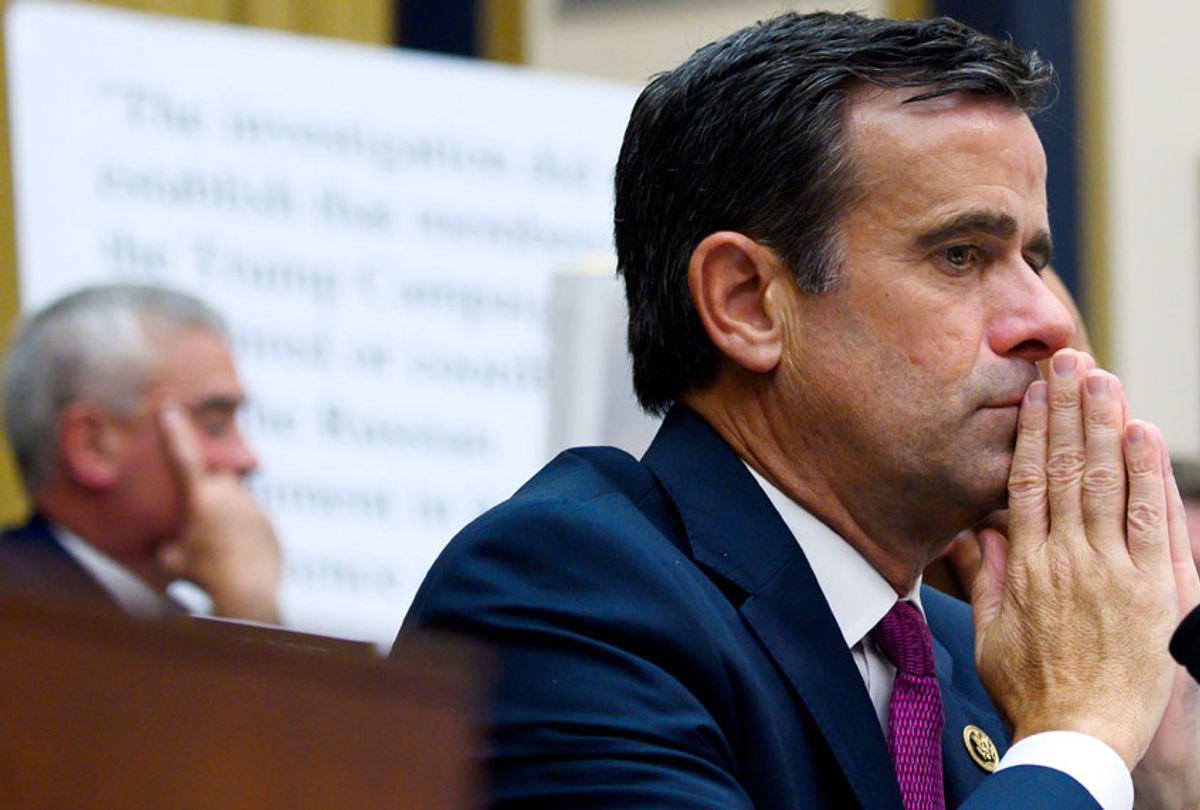President Donald Trump's pick for the next director of national intelligence, Rep. John Ratcliffe, R-Texas, has come under scrutiny amid accusations that he embellished his role in the high-profile anti-terrorism case which he has repeatedly touted among his credentials related to national security issues.
The alleged embellishment is related to his role as a federal prosecutor in a case known as the U.S. v. Holy Land Foundation, which ended in 2009 after a Texas-based charity was found guilty of funnelly money to the U.S.-designated terrorist group Hamas.
Ratcliffe has highlighted that he has "convicted individuals" involved in the scheme, but ABC News and NBC News this week cast doubt on his claims.
According to the news outlets, in a 2015 press release, Ratcliffe's congressional website stated, "When serving by special appointment in U.S. v. Holy Land Foundation, he convicted individuals who were funneling money to Hamas behind the front of a charitable organization." Ratcliffe's name, however, does not appear in the Holy Land trial record.
In February 2016, according to ABC News, a post on his official campaign website lauded his "special appointment as the prosecutor in U.S. v. Holy Land Foundation, one of the nation's largest terrorism financing cases."
ABC News reported that it found no public records tying Ratcliffe to the two trials involved in the case and that officials involved in the investigation did not recall him having a role. NBC News disputed Ratcliffe's assertion that he "put terrorists in prison."
During his time as a federal prosecutor, Ratcliffe was appointed by President George W. Bush as chief of anti-terrorism and national security for the Eastern District of Texas. Matthew Orwig, the U.S. attorney who led the office at the time, told ABC News that Ratcliffe worked on several cases involving domestic and international terrorism, but he declined to name specific cases.
"People see trials, and people see the high-profile stuff. And that's really just a tiny percentage of the great work that's done by law enforcement every day since 9/11," Orwig told the outlet. "When you think about it, for the last 15 years, he's very much been in the national security arena: first as anti-terrorism coordinator, then as U.S. attorney, then as a congressman on the Judiciary Committee, the Homeland Security Committee and the Intelligence Committee."
"I can't think of anyone who would have a better background that equips them for the position," Orwig added.
In response to the ABC News and NBC News reports, Ratcliffe spokeswoman Rachel Stephens said Monday that the congressman's status regarding the case was instead related to investigating issues surrounding what led to the mistrial in the first case.
"Because the investigation did not result in any charges, it would not be in accordance with Department of Justice policies to make further details public," Stephens said in a statement to ABC News. "However, Department of Justice records will confirm that as both chief of anti-terrorism and national security for the Eastern District of Texas from 2004-2008, John Ratcliffe opened, managed and supervised numerous domestic and international terrorism related cases."
Stephens did not specify which terrorism cases Ratcliffe posecuted, however, and did not comment on the discrepancy between the statement on Ratcliffe's website that he "convicted individuals who were funneling money to Hamas."
Additionally, the Daily Beast reported Tuesday that Ratcliffe played a major role last year in promoting a conspiracy theory that a "secret society" operated within the FBI as proof that the nation's top law enforcement agency had been biased against Trump in the run-up to the 2016 election.
Ratcliffe is expected to face an uphill confirmation battle to become the nation's next director of national intelligence. A senior Democratic aide on the Senate Intelligence Committee, where Ratcliffe will face a confirmation hearing, told ABC News on Monday that it's "safe to say we will be looking at his experience and record in intelligence-related issues."
Trump announced in a tweet Sunday that Dan Coats will step down as the director of national intelligence on August 15 and, in his place, Ratcliffe will head the intelligence community. His nomination followed his aggressive questioning of Robert Mueller during the former special counsel's congressional testimony last week.
The staunch Trump ally garnered praise from the president's allies for his aggressive questioning of Mueller, in which he declared: "The special counsel's job — nowhere does it say that you were to conclusively determine Donald Trump's innocence or that the special counsel report should determine whether or not to exonerate him."
"I agree with Chairman Nadler this morning when he said Donald Trump is not above the law. He's not," Ratcliffe added. "But he damn sure shouldn't be below the law, which is where Volume II of this report puts him."
House and Senate leaders in both parties appeared rattled at the news that Coats was stepping down. Democrats condemned Trump's pick, with House Speaker Nancy Pelosi, D-Calif., stating Coats' resignation "is bad news for the security of America." Senate Majority Leader Mitch McConnell, R-Ky., also said he was "very sorry to learn" that Coats would be leaving his job.
Senate Minority Leader Chuck Schumer, D-N.Y., vehemently denounced Trump's plan to nominate Ratcliffe to replace Coats.
"It's clear that Rep. Ratcliffe was selected, because he exhibited blind loyalty to President Trump with his demagogic questioning of former special counsel Robert S. Mueller III," Schumer said in a statement. "If Senate Republicans elevate such a partisan player to a position that requires intelligence expertise and nonpartisanship, it would be a big mistake."



Shares